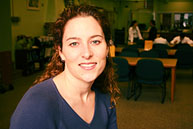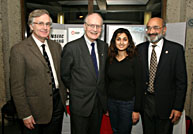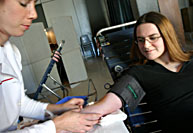In focus
Cath Mortin: Serving society through sport
If Cath Mortin were to find herself living in the Antarctic, she would likely be coaching the local herring hunting team and learning to speak penguin.

Claudio Calligaris
The McGill biomedical engineering master's student's curriculum vitae certainly bespeaks a trend. Wherever she has lived — El Salvador, Tunsia, China, Australia, Washington, D.C. — she has learned the language and volunteered for a bewildering variety of causes, be it recreational associations, homeless shelters or Big Brothers/Big Sisters.
In fact, it seems the only experience that Mortin does not throw herself into wholeheartedly is being interviewed for newspapers. She confessed to being reluctant to speak to the Reporter for this article.
"I'm not anything special, really," she said.
Even people who know Mortin might be taken in by that statement — she's not one to talk up her accomplishments. People have noticed her though: Mortin won a Forces Avenir Graduate Student Award last year, and has a plethora of other scholarships and awards to her credit as well.
It's difficult to sum up the nature of her prodigious volunteer and community experience. At the moment, as she is focusing on completing her degree, she has cut back on extra-curricular activities: right now she is the coordinator for intramural water polo, involved with the triathalon club and the Post-Graduate Students' Society — and that's just at McGill. She is also a volunteer with Big Brothers/Big Sisters and at the Milton-Park Recreation Association as the inner-city community programs coordinator and as a coach.
"I really believe in personal development for young people through sport," she said.
"I had opportunities when I was young to get involved in lots of activities, and I think it's important to on the one hand help kids have those opportunities, and on the other hand provide some sort of help in developing the framework for programs."
For Mortin, the children whom she coaches at the recreation centre aren't just playing games, they're growing as human beings.
"We're not focused on being the best player, we're focused your improvement and your development as a person."
Working at that recreation centre draws on more than Mortin's considerable sporting expertise (she's been a coach and athlete in multiple sports for more than a decade).
"You're dealing with a diverse group of kids, and a diverse group of parents from a variety of cultural backgrounds," said Mortin.
In addition to English and French, Mortin also speaks Spanish, Chinese, Arabic and is picking up Japanese.
"You're dealing with kids who only speak French and parents who don't speak French, and who in some cases don't even speak English, so I find myself speaking Spanish with the parents and French with the kids, or Chinese with the parents and English with the kids," she said.
The languages are a handy skill for her current volunteer work, and one that has been picked up over her years of overseas living.
Don't call it travelling though.
"I don't like to think of it as travelling — I've relocated a few times," she said, explaining that wherever she's gone she's stayed for up to three years at a time. And wherever she has gone — as a student in Shanghai or a website developer for a software company in Tunisia — she has found a way to get involved in the local community.
"My focus has always been living with the people, as the people," she said.
 |
||||
|
[With a legal business], what you try to do is absorb the business of the competitors. You want to absorb all of that profit into your own company. With an illegal business, it's just the opposite. |
||||
NSERC hits the quarter century

At the NSERC 25th anniversary celebrations are NSERC chairholder Ronald Stewart, NSERC director Tom Brzustowski, SPARK writer and anatomy and cell biology student Mythri Kappagantula and physics professor Popatlal Patel, a 25-year NSERC grant-holder.
Owen Egan
The temperature in Montreal last Tuesday was certainly frigid but that was about as extreme as the weather got, unless of course you were present at the lecture by Ronald Stewart — McGill's NSERC Chair in Extreme Weather. Stewart's research was one of several presentations commemorating the creation of Canada's Natural Science and Engineering Research Council (NSERC) — twenty-five years ago.
In attendance at the presentations were NSERC director Tom Brzustowski, and representatives from the Meteorological Service of Canada (MSC) and the Institute for Catastrophic Loss Reduction (ICLR) — the two industrial sponsors of the Chair in Extreme Weather. Stewart's position is the most recent of sixteen Chairs created through NSERC funding at McGill University. "These positions significantly enhance both the research and training capacity of the departments involved," Stewart said during his presentation.
Last year NSERC began funding a SPARK (Students Promoting Awareness of Research Knowledge) program at McGill. The SPARK program is an exciting new initiative, which encourages students to write about the scientific research conducted at their university. McGill's SPARK students have publicized research in the Globe and Mail, National Post, Montreal Gazette, Canadian Geographic and National Geographic News.
Over the twenty-five years that NSERC (formally the NRC) has been in operation, the organization has provided over $550 million of funding to McGill University researchers. This year alone, McGill's academics secured over $30 million in research funds. Part of Tuesday's celebrations consisted of an award ceremony for the 88 members of McGill's academic community who have held NSERC research grants for the entire history of the organization — a particularly impressive statistic which amounts to over 2000 years of funding — now that's extreme!
 |
||||
|
Normally it should be liquidy. It should flow along. |
||||

Is it a smile or a grimace? Either way, second year psychology student Isabelle Proulx doesn't seem too perturbed by the big freakin' needle Hema-Quebec nurse Isabelle Daigneault is preparing to stick in her arm. Proulx was donating some of the red stuff at the Hema-Quebec Blood Donor Clnic on the third floor of the University Centre, which runs until Friday, January 23.
Owen Egan
